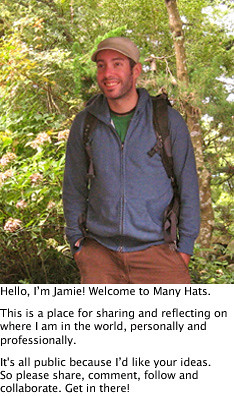Disrupting Class
It’s time to catch up on my reading.
I’ve spent so much time finicking around with getting this blog the way I temporarily want it (with the clear understanding that ideally, it would be nothing like this, really, given the time…), that anyways, I’ve already fallen behind on posting about the articles I’ve been reading. The immediate challenge with that, of course, is that by the time I get to posting about them, I basically have to go back and re-read to figure out what all my little highlights and post-its were about (though Diigo clearly exceeds the delicious scope by having these mark-up features… a whole different beast…).
I’ve just re-read
Disrupting Class: Student-Centric Education Is the Future
How radical innovation will change the way we teach and kids learn.
By Clayton M. Christensen, Michael B. Horn
and there are things that are still sticking in my throat.
Naturally, I agree with his premise that student-centred learning is a more resonant philosophical approach than teacher-centred, but he also seems to be waving this flag of glory for students sitting in noise-cancelling headphones learning by a range of multiple intelligences that are all catered to by digital, screen-based means. First of all, I’m sitting here in noise-cancelling headphones now, trying to block out my partner’s Skype conversation with her sister and three-year old niece. The headphones aren’t useless, but I’m struggling to maintain my bubble of auditory serenity. Second of all, the pitch for multiple intelligences being served by a variety of screen-based means rings a bit false for me. I have no doubt that the grouchy construction worker helping the student in the article assemble mandarin sentences is far superior (in terms of range, immediacy and motivational capacity) to some of the textbooky teaching it’s meant to replace, but I think it’s delusional to imagine that it’s going to serve a whole new breed of learners. In a way I think it’s exactly the same learners who are successful with the textbooks who’ll likely be successful with this sort of software.
Generally, I think that the premise of the article rubs up wrong against my primary belief in the value of collaborative learning and hands-on experience. Making friends, finding co-conspirators, getting dirty, taking public risks… These seem to me to have a lot of value that’s hard to replicate or replace in the future classrooms described.
A crux of the article rests on the difference between innovations that sustain the status quo through incremental improvements, and those that disrupt it by reaching out to consumers (students) who wouldn’t be reached otherwise. My problem with it is that while that part of the premise rings true, perhaps the examples he proposes of disruptions, seem at times awfully sustaining.
I’m going to have to re-read it again.
Related
4 Responses to Disrupting Class
Leave a Reply Cancel reply
This site uses Akismet to reduce spam. Learn how your comment data is processed.
MY CLASS BLOG
This is my classy, yet personal blog. For my less personal –but perhaps classier– classroom blogs, click here, or here.MANY HATS in your inbox
Subscribe to Many Hats...

many hats by Jamie Raskin is licensed under a Creative Commons Attribution-NonCommercial-ShareAlike 3.0 Unported License.Details… details…
CATEGORIES
@jamieraskin
My TweetsINVASION PROGRESS
HISTORY
MANY COMMENTS








Dear Jamie
Maybe I should focus more on blog posts that challenge my beliefs rather than those that resonate with my own thinking. I have to agree that there was a general feeling to the article that did not sit well with me. I also feel strongly that education is all about relationships – relationships with people, places and things.Loris Malaguzzi reminds us, “I believe there is no possibility of existing without relationship. Relationship is a necessity of life.” (The Hundred Languages of Children, 1998)
Thanks for your post
Clair
Hi Claire – relationship being so important and while on-line relationships are important to be competent in, it doesn’t diminish the importance of off-line relationships or necessarily translate over as the same skills.
You and Alex G have some similar points in your reflections and I’m right there with you. I found the isolation of the work happening in this class disappointing. As we advance in education, I think we will grow to see the classroom as the place where face to face aspects of learning takes place and out of class where the emphasis is on independent learning/collaborative preparation. I asked Alex roughly the same question because I’m quite interested in the dialogue about the answer. Do you have any thoughts about the relative importance or use of in school/out of school use of time and technology?
I see completely what you mean, when you talk about the classroom being increasingly a place for the face to face elements of learning.
What I wonder, with that in mind, is how that plays forwards (or downwards) in terms of earlier education. Through a second grade lens, as much as I find increased productivity with some of my experiments with uses of technology, I’m continually struck by the need to focus equal, or greater emphasis of time and energy into creating, planning and resourcing rich collaborative learning experiences that are often more experientially-focused. I think I can feel a blog post with this focus coming on…